Is Scream Supposed to Be Funny
I love the Scream movies, as many fans do. I don't think Scream, as a franchise, is necessarily divisive, but I do think that both the people who do and don't like it are passionately vocal. But one of the biggest things I've noticed between Scream and other franchises is that sometimes I find myself agreeing with the people who don't like the series. That never happens for me with A Nightmare on Elm Street, Friday the 13th or Halloween, but it happens with Scream.
The reason, I think, is that people go into Scream with immediate, preconceived notions of what it is. Many hardcore horror fans don't like it because all they can see is how inaccurate it is. It plays into genre stereotypes that are cemented by the one scene that defines the franchise in everybody's mind: the scene in which a drunken Randy explains the rules of how to survive a horror film. Anyone who's seen a handful of slashers will know that while these are certainly common threads in the genre and are typical conventions that everyone talks about, there are hundreds of features that break them. There are plenty of horror flicks in which the virgin dies, in which people drink and survive, and in which people leave the room and do at some point come back.
Many fans out there hate Scream and its sequels because they believe it is trying to outsmart the genre. They look at the film and to them it looks like it's looking down on everything they love. As if there's something about it that says "Horror films are okay, but this one is smart." It's hard not to get a little flustered when you look at it through that lens, but that's not what the movie is at all. The problem, unfortunately, is that this false idea of what Scream is also happens to be the very reason a lot of people love it.
Related: Find Out if this Film is Based on a True Story Right Here!
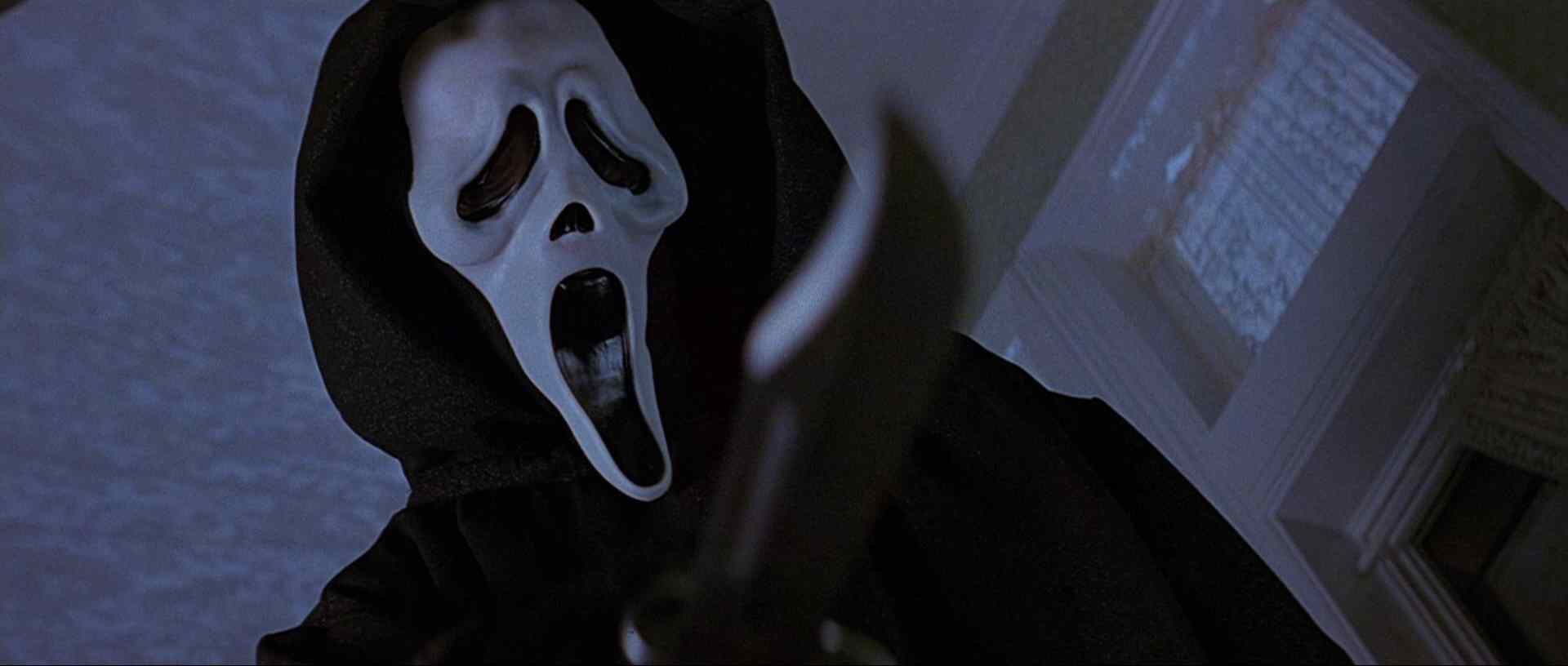
The reason Scream became so widely known for being this super-smart commentary that turns its nose up at the genre is because that's what too many of its own fans think it actually is. They truly believe that it's the horror movie that hates horror movies and that's why they love it.
But if Scream wasn't conceived out of a passion for the films that came before it, it would never have had Wes Craven as the director. This picture needed a master of horror at the helm in order to work. Of course Scream is a commentary on the genre. Of course it points out trappings, conventions and stereotypes at every opportunity. It's smart that these are characters in a real-world environment in which they can name-drop every horror film they can think of. But it's even smarter than people think it is, because it's pointing out assumptions of what people think horror is as a whole. That's the most frustrating thing, I think. Both the groups that love it and hate it aren't giving it enough credit.
See Also Look Who's Stabbing: At Which Point Was Ghostface Billy and at Which Points Was He Stu?
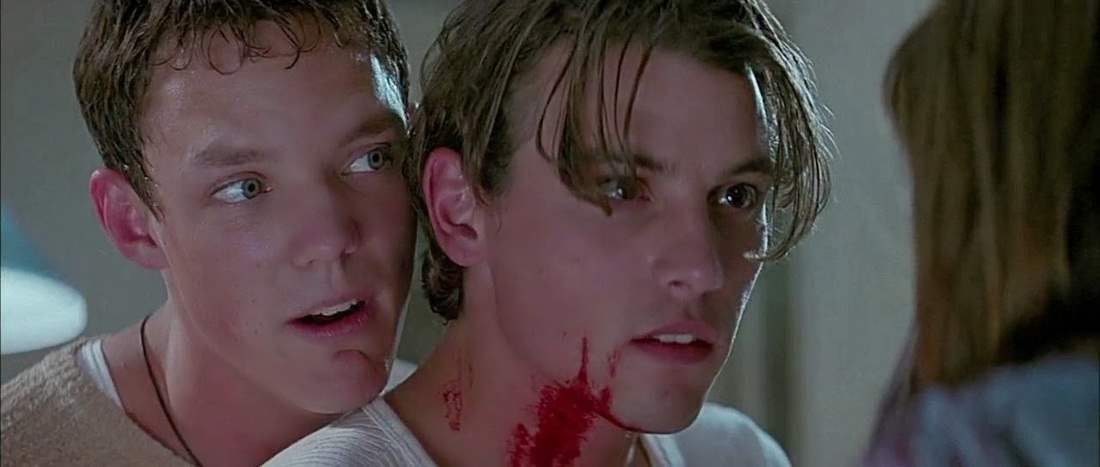 Let's take a look at the infamous rule scene given to us by Randy, a character fans could immediately trust because they could relate to him so much. Randy, by this point, is already drunk off his ass, probably his least trustworthy point in the entire film. He gives three rules for surviving a horror film: 1) you can't have sex, 2) you can't do drugs, 3) you can't ever say "I'll be right back." You can immediately bring to mind tons of slashers that at least appear to follow these rules.
Let's take a look at the infamous rule scene given to us by Randy, a character fans could immediately trust because they could relate to him so much. Randy, by this point, is already drunk off his ass, probably his least trustworthy point in the entire film. He gives three rules for surviving a horror film: 1) you can't have sex, 2) you can't do drugs, 3) you can't ever say "I'll be right back." You can immediately bring to mind tons of slashers that at least appear to follow these rules.
Not only are these rules constantly broken in even the biggest horror films (Alice in Friday the 13th is implied to have had sex with Steve and actress Adrienne King certainly doesn't believe the character is a virgin, and Laurie Strode smoked weed in Halloween, to provide two examples) but these rules are more importantly broken in this film itself. Sidney has sex with Billy. Randy, drunk when explaining the rules, as stated, survives. And Stu, the person who mockingly says "I'll be right back" right after Randy says not to, is actually one of our two killers.
This is one of many genius elements of Scream that goes widely overlooked. The real point of Scream, though, is actually a very simple one: Horror movies are scary, but real life is always scarier. This theme is a heavy undercurrent throughout the entire feature, from beginning to end. The opening scene is, as stated by John Landis, a master class on making a horror film. It's maybe the most effective opening of any horror feature, it's so good. The trivia that Casey is subjected to is fun and inventive—at first. But I've been lucky enough to see it in a theater with a huge audience and while they laughed at the first few references, they quickly went completely silent.
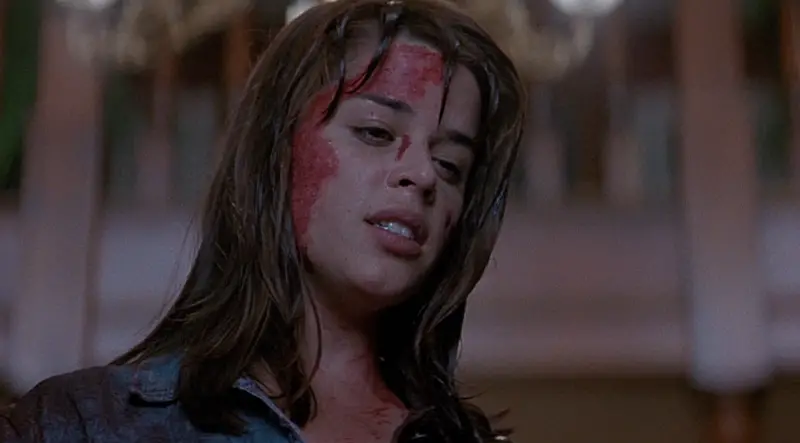 That witty, fun opening turns on a dime and becomes absolutely terrifying. This poor girl is so believably terrified. The scene starts off polished and begins to feel more and more raw until we reach the end of it, which is a pure and effective punch to the gut as a mother is forced to listen to her daughter's dying breaths over the phone.
That witty, fun opening turns on a dime and becomes absolutely terrifying. This poor girl is so believably terrified. The scene starts off polished and begins to feel more and more raw until we reach the end of it, which is a pure and effective punch to the gut as a mother is forced to listen to her daughter's dying breaths over the phone.
Sidney is the only one of the main group of characters who has no taste for horror, and it's because she is recovering from an actual personal tragedy, one that she gained unwanted national attention for when her mother's death became a widely televised court case. At the start of Scream, Sidney is disinterested in horror films because she's literally already lived one. She's been a survivor dating back to the very first time we saw her. The role she fills is not one she's chosen for, but one she seems born into, leading her to constantly and reasonably wonder if this is her fate throughout the franchise.
The ending really drives the whole point home, considering that once the masks come off, Scream feels like it transitions from a slasher into a true crime movie. Billy and Stu are very believable, real-life villains. Uncomfortably so, in fact. Already unstable, they used horror films as nothing more than a point of reference. These two killers are made all the more disturbing by the fact that they preceded the Columbine massacre by such a short amount of time.
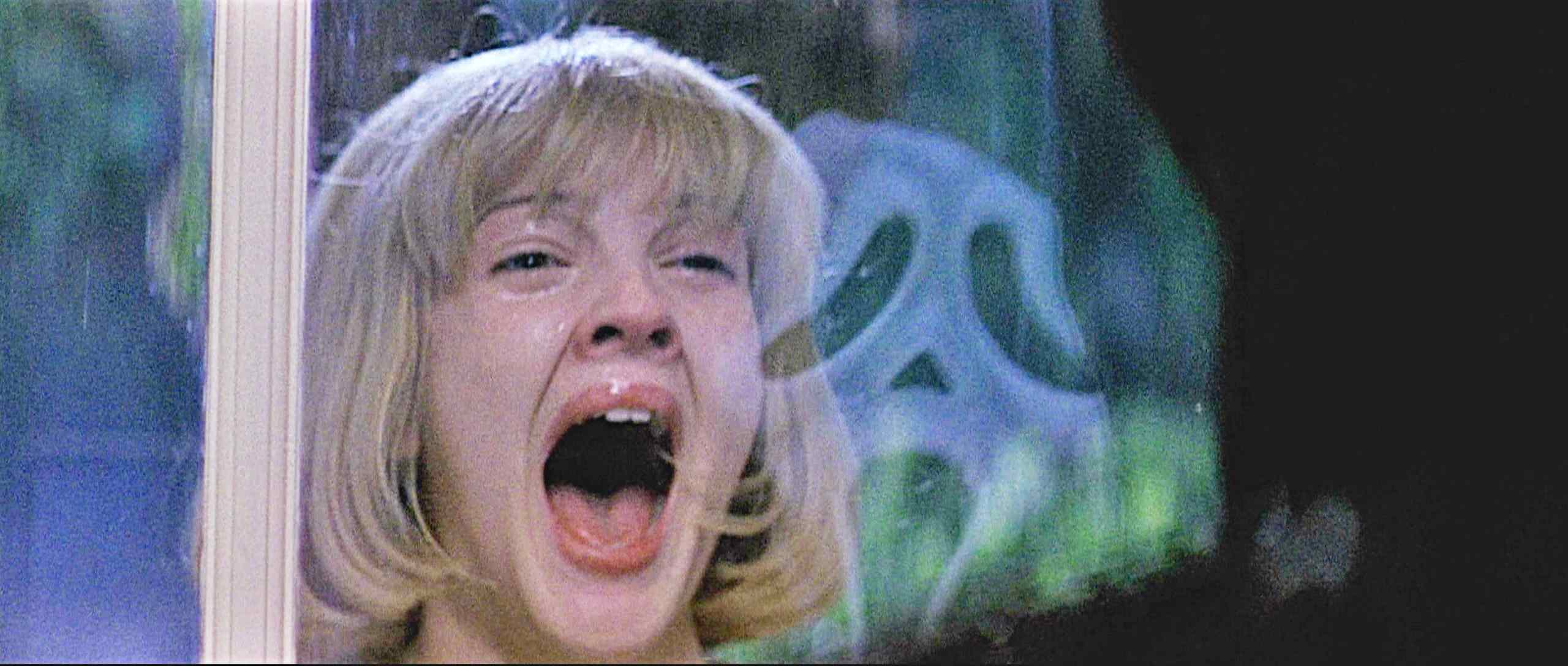 As a character, Sidney's most prominent, obvious filmic reference comes at the very end. She hasn't been name dropping titles like her friends have been, has been adamant that this is real-life and that it's not a movie, an almost unconscious attempt to pull Billy back into reality before she even realizes he's the killer. But when Randy tells her what the killer is supposed to do at the end, she simply puts a bullet in Billy's head and says "Not in my movie."
As a character, Sidney's most prominent, obvious filmic reference comes at the very end. She hasn't been name dropping titles like her friends have been, has been adamant that this is real-life and that it's not a movie, an almost unconscious attempt to pull Billy back into reality before she even realizes he's the killer. But when Randy tells her what the killer is supposed to do at the end, she simply puts a bullet in Billy's head and says "Not in my movie."
This is both one of the most and important and overlooked lines in the entire feature. It's about someone who has been unable to get a handle on her life for a very long time finally being able to take control. But it's also about the anarchistic nature of horror that Scream represents. People think there are rules in horror. Mainstream critics have always thought this, but it's not true.
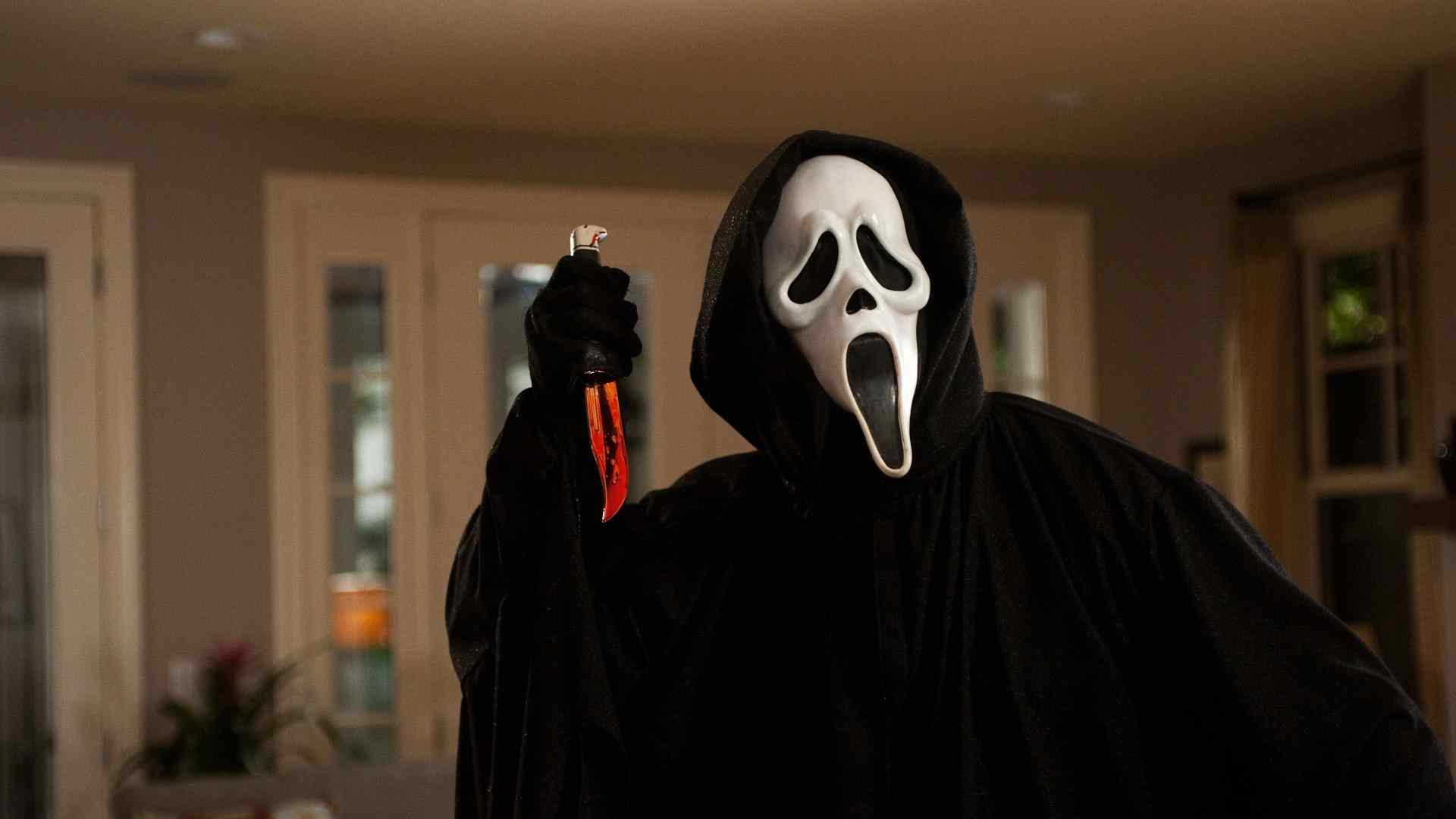 The rules in Scream are intentionally broken because the point isn't just that there are no rules, or that real life doesn't have rules, but that the great horror films are the ones that break the rules. Great horror movies break down the roadblocks put in front of them. That's why there was never anyone better than Wes Craven to direct this, because he made this point over and over again throughout his career. The Last House on the Left broke the rules. A Nightmare on Elm Street broke the rules.
The rules in Scream are intentionally broken because the point isn't just that there are no rules, or that real life doesn't have rules, but that the great horror films are the ones that break the rules. Great horror movies break down the roadblocks put in front of them. That's why there was never anyone better than Wes Craven to direct this, because he made this point over and over again throughout his career. The Last House on the Left broke the rules. A Nightmare on Elm Street broke the rules.
And Scream, of course, broke the rules. Whether people realize it or not, that's the reason it's lasted for twenty years. That's the reason this franchise is still continuing on television. Scream carved out a place for itself to say things bluntly about the genre, and that's something we'll probably always need in some form or another. But it all comes from a place of respect.
Scream is a love letter to horror films, not a hate letter, and that's what too many people don't get.
Follow us on social media! Twitter, Facebook, and Instagram.
Source: https://wickedhorror.com/features/editorials/heres-fans-dont-understand-scream/

0 Response to "Is Scream Supposed to Be Funny"
Post a Comment